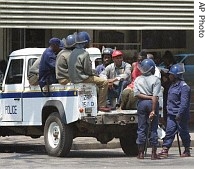-
(单词翻译:双击或拖选)
By Tendai Maphosa
Harare
13 September 2006
In Zimbabwe, police have prevented protest marches organized by the Zimbabwe Congress of Trade Unions from taking place. In Harare and elsewhere in the country, the police sealed off the places where marchers were supposed to gather and arrested trade union leaders.
-------
 Riot police keep an eye on detained protesters after they were arrested in Harare |
||
But by midday in Harare, when the march was meant to start, there was no sign of any marchers or the leaders of the Zimbabwe Congress of Trade Unions, who had called for the nationwide protests.
Police stopped all motorized traffic from approaching the point where the march was supposed to start but pedestrians1 were generally left alone.
Armed police kept an eye on the people within the cordon2. Youths in ruling ZANU-PF T-shirts also patrolled the streets. The government had declared that the marches were illegal and warned that the security forces were ready to deal with those who took part.
About 15 leaders of the Zimbabwe Congress of Trade Unions, including Secretary- General Wellington Chibhebe and Chairman Lovemore Matombo, were assaulted and taken away by the police.
Sources in Bulawayo, Zimbabwe's second city, told VOA that the planned march there also failed to take place and that about 20 trade union organizers were arrested. VOA also has information from other centers that brings the total those arrested nationwide to more than 80 people.
Various civic3 organizations had pledged to participate in the marches, including the Zimbabwe National Students Union. Promise Mkwanazi, president of the union, blamed what he called the government's heavy-handed action for the failure of the marches to take place. But he said the worsening economic conditions in Zimbabwe would eventually force many people to respond to further calls for mass action.
"I think it remains4 the only viable5 option - peaceful democratic resistance [to] the current regime - because the government has demonstrated its unwillingness6 to address people's concerns in a more rational way," he said.
Zimbabwe is currently facing its worst economic crisis since independence 26 years ago. Inflation is close to 1,000 percent, unemployment stands at 80 percent. Fuel and foreign currency are in short supply. The country has been suffering for years from shortages of food and other basics. What supplies are available are beyond the reach of the majority of the population.
 收听单词发音
收听单词发音
1
pedestrians

|
|
| n.步行者( pedestrian的名词复数 ) | |
参考例句: |
|
|
|
2
cordon

|
|
| n.警戒线,哨兵线 | |
参考例句: |
|
|
|
3
civic

|
|
| adj.城市的,都市的,市民的,公民的 | |
参考例句: |
|
|
|
4
remains

|
|
| n.剩余物,残留物;遗体,遗迹 | |
参考例句: |
|
|
|
5
viable

|
|
| adj.可行的,切实可行的,能活下去的 | |
参考例句: |
|
|
|
6
unwillingness

|
|
| n. 不愿意,不情愿 | |
参考例句: |
|
|
|















